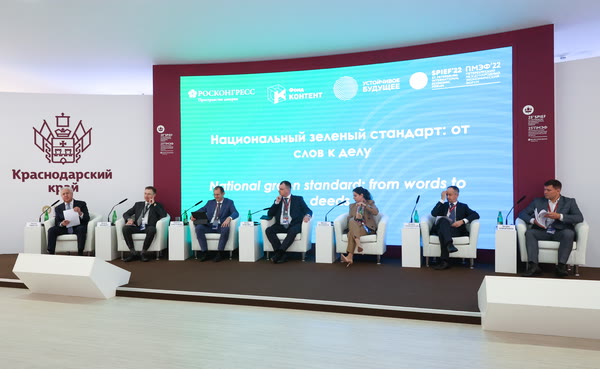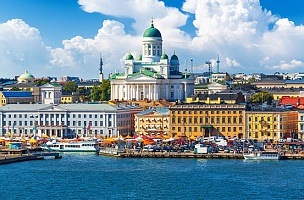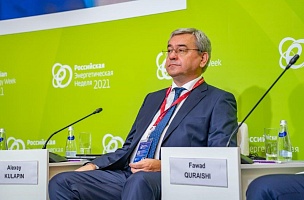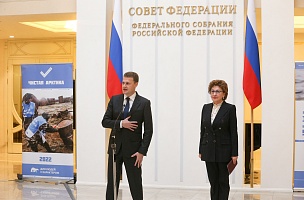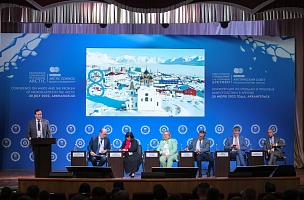Key conclusions
ESG standards are still very much needed by Russian exporters
“Russia is an integral part of the global economy. Our companies continue to export their products to international markets. One of the main reasons our industrial companies try to comply with the standards of responsibility in their production as much as possible is because both buyers of their products in the West, they have historically been selling to, and buyers in the East ask what the carbon footprint of products is or how responsible methods they were produced. Therefore, Russia as part of the global economy relies on international standards,” Dmitriy Aksakov, Vice President, VEB.RF.
“Very interesting processes in the field of ESG and criteria for what the green agenda is in general are happening in Asia. They are very different from what has happened and is happening in the countries of the West and Europe. The European approach follows short guidelines. You read and follow them,” Sergey Tverdokhleb, General Director, MCC EuroChem; Member of the Board of Directors, SUEK.
“The popular idea is that, given the fact that we have much more complicated international relations, the European Union and the United States of America as drivers of this agenda are not our partners. It's true and this means that we can not to move in this direction. This is a big mistake. We continue to exist in the international trade and economic field,” Vladimir Chistyukhin, First Deputy Governor, The Central Bank of the Russian Federation (Bank of Russia).
The whole world needs to ensure the quality of life
“Environmental and climate issues will never be localized either within one company or within one country. They will always remain common and they need to be solved together,” Marina Slutskaya, Sustainability Director, DOM.RF Bank.
“Standardizers often quote the Russian philosopher Ivan Ilyin who said a wonderful phrase back in the early 20th century: ‘The salvation of Russia is in quality’. But after all the quality is not just the product quality. The national quality infrastructure is primarily the quality of life. What kind of national quality of life infrastructure we talk about if we don't solve issues and develop a green sustainable agenda? It seems to me this is our common task. There is no discussion whether it is relevant or not. It is always relevant,” Anton Shalaev, Head of the Federal Agency on Technical Regulating and Metrology (Rosstandart).
PROBLEMS
There is temporary less money for ESG
“What has changed dramatically? There are changes indeed. The issue of resources has changed – they are very limited today. Budget resources are limited. Resources of companies that were previously ready to actively invest in the green agenda and, to a lesser extent, in the social agenda are limited as well. [...] At the moment, resources are limited. When the situation becomes a little easier, everything should be ready to move sharply towards the implementation of this direction in order to meet the benchmarks and achieve carbon neutrality by 2050 or 2060,” Vladimir Chistyukhin, First Deputy Governor, The Central Bank of the Russian Federation (Bank of Russia).
Incentives are required for Russians' demand for ESG
“You will solve the issue in Moscow and St. Petersburg. But let's be honest, what about the rest of Russia? Do you think a typical citizen of Vologda has a choice to buy a house with or without a green certificate? Of course not, he counts his money,” Sergey Voropanov, Mayor of Vologda.
“We expect that there will be some incentives and disincentives. But first of all, we hope for incentives like green mortgages or green project financing that will create a comparative advantage for the construction of ecofriendly houses,” Marina Slutskaya, Sustainability Director, DOM.RF Bank.
“Essentially, we need to understand what kind of economic model we will have, what kind of costs the budget should incur for structural adjustment, and how corporations will cope with the shocks and challenges that have befallen them. From my point of view, a meaningful dialogue on this can start in the beginning of 2023,” Vladimir Chistyukhin, First Deputy Governor, The Central Bank of the Russian Federation (Bank of Russia).
The country needs its own ESG infrastructure
“There is a number of important forks that have not yet been passed, including measures to support the implementation of climate projects or imbalances of the punitive and stimulating functions of the state on decarbonization measures. What we need to do faster is to create and develop our own national infrastructure: verifiers, tools, institutions and certifications are badly needed. We need our own national climate rating, because now we are not included in other ratings. In fact, most of our contractors and consumers are still interested and ready to consider the authoritative ratings available in the country. Our own infrastructure for confirming the carbon footprint of products is also very important to us,” Sergey Tverdokhleb, General Director, MCC EuroChem; Member of the Board of Directors, SUEK.
There is not enough clear communication on the topic of ESG
“There is a lot of speculation. There is a lot of greenwashing. We used to see a lot of greenwashing in the green construction. When you drive along the road, you usually see advertisements or billboards saying ‘eco house’, ‘eco village’ and so on. But it's not really ‘eco’. When your village or house is located in a green zone next to a pond, it does not mean it is environmentally friendly,” Rashid Ismailov, Chairman, Russian Ecological Society.
SOLUTIONS
“This year, after February, a number of businesses, including large ones, came out with an initiative to reform the technical committee for standardization called ‘Sustainable Development’ to develop their own national standards, including reporting, in the field of sustainable development. This is a business initiative,” Anton Shalaev, Head of the Federal Agency on Technical Regulating and Metrology (Rosstandart).
“So far, a large number of companies have closed the disclosure of information about their finances, status, all the information that may contribute to additional sanctions pressure. And that's right. We are currently examining how much disclosure of additional non-financial information can be considered in the context of additional sanctions pressure,” Vladimir Chistyukhin, First Deputy Governor, The Central Bank of the Russian Federation (Bank of Russia).
“International systems that used to work in Russia have suspended their activities. In this regard, we have tried to absorb into our standard – this is still a project, but we really hope for an early finalization – all the best experience that has been accumulated. These systems, worldwide and in Russia, mainly evaluate commercial real estate. Residential real estate accounts for a smaller part of the assessment. However, taking into account the fact that the construction industry and housing and communal services produce about 40% of Co2 emissions, and housing and communal services depend, to a certain extent, on construction, how the house is built, it is very important to focus on residential real estate accordingly. This can make a really big contribution to climate ecology,” Marina Slutskaya, Sustainability Director, DOM.RF Bank.
“Are there fewer resources to implement the climate agenda? Yes, of course. But in fact, previously there were not that many of these resources. That is why we have always proceeded from a fairly simple paradigm: our country has such a feature that is very convenient for the implementation of the green agenda and climate topics, so we need to do a lot of important urgent tasks facing us in various areas, which at the same time lead to an improvement in the environmental situation and a reduction in greenhouse gas emissions. [...] The current situation only provides additional opportunities for such a combination,” Sergey Tverdokhleb, General Director, MCC EuroChem; Member of the Board of Directors, SUEK.
“GOST standards are voluntary, but the law on standardization has a unique opportunity that is being used more and more: the use of references to GOST standards in regulatory legal acts. And what happens? As soon as you have a reference to GOST in a regulatory legal act, a de jure voluntary document becomes a de facto mandatory one,” Anton Shalaev, Head of the Federal Agency on Technical Regulating and Metrology (Rosstandart).


